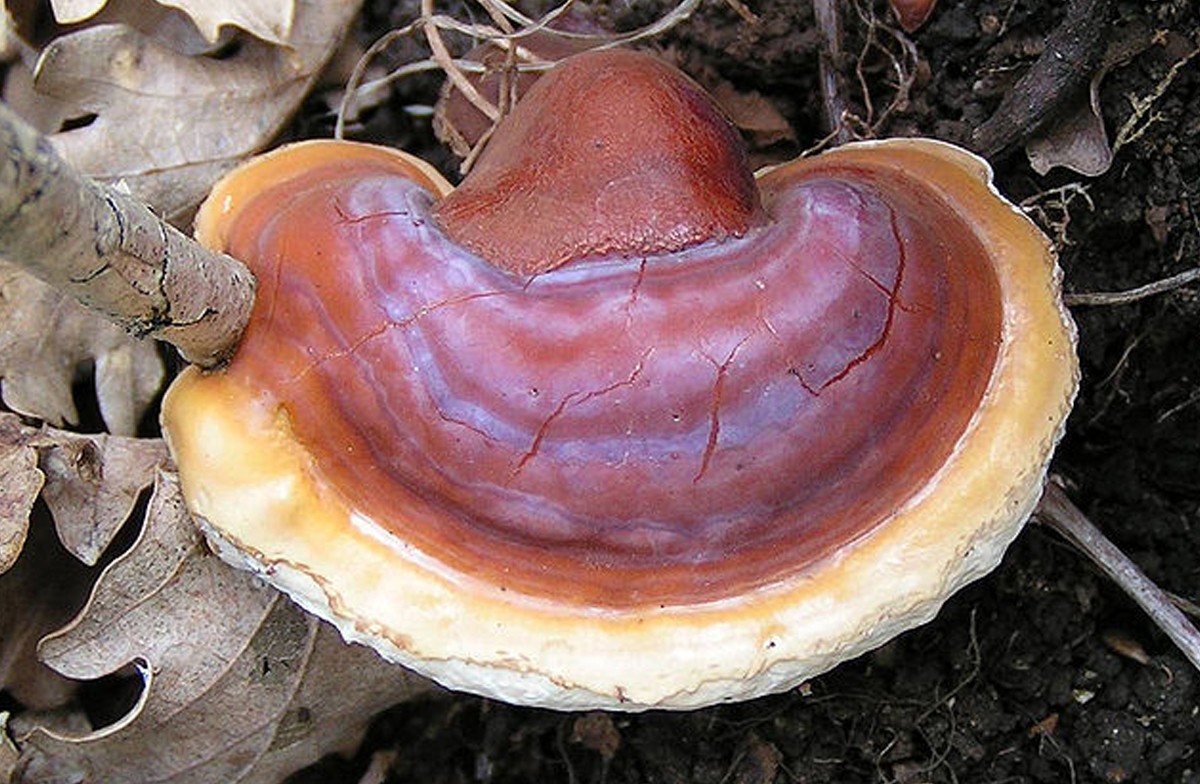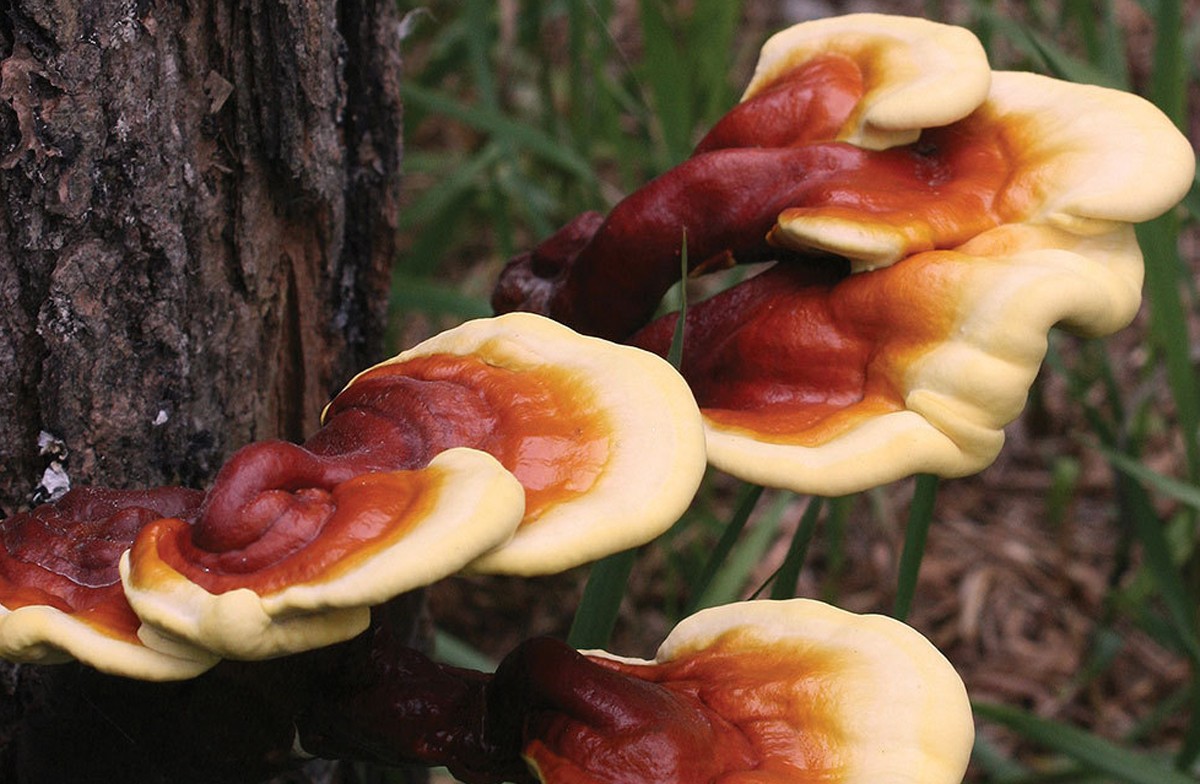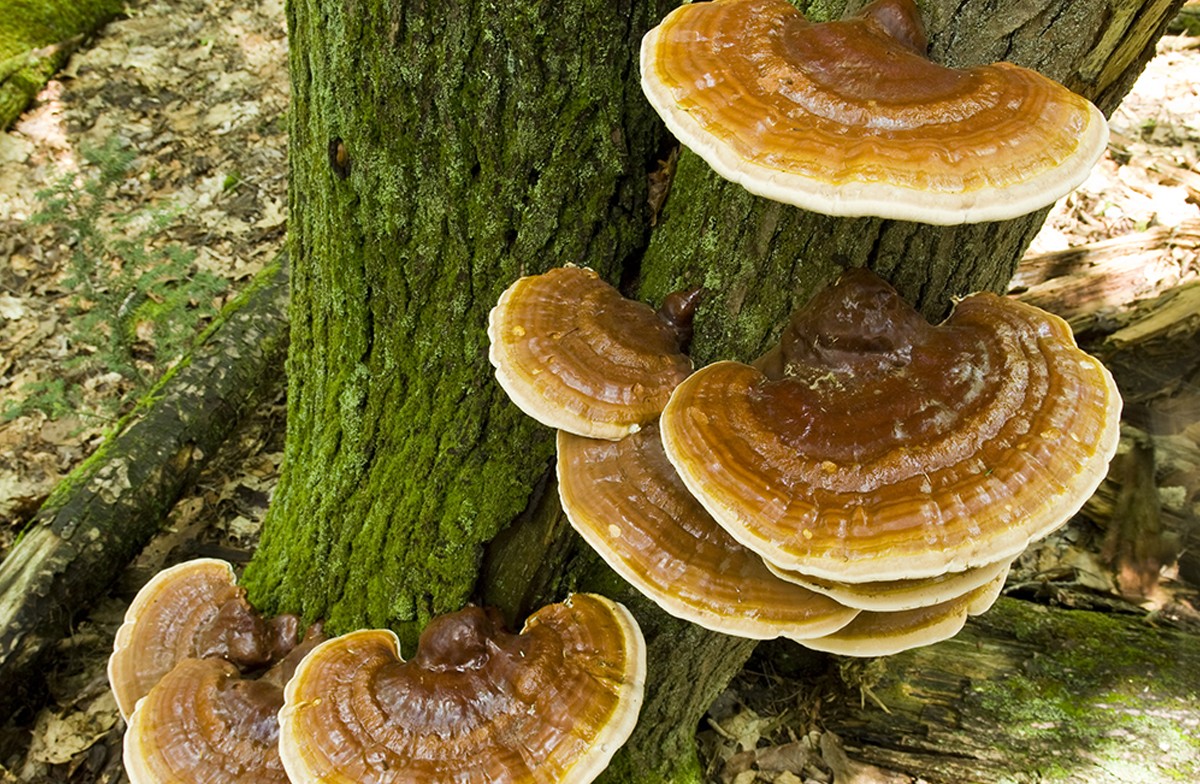Ganoderma lucidum
Ganoderma lucidum, also known as reishi mushroom or lingzhi, is a type of mushroom that belongs to the genus Ganoderma. It is a woody and shelf-like mushroom that grows on the trunks and stumps of deciduous trees, particularly oak and maple trees, in Asia, North America, and Europe.
The fruiting body of the Ganoderma lucidum mushroom is kidney-shaped, with a shiny and reddish-brown cap that can grow up to 30 cm in diameter. The underside of the cap is covered with tiny pores, from which the mushroom releases its spores.
Ganoderma lucidum is a saprophytic fungus, meaning that it obtains nutrients from decomposing organic matter, particularly from the wood of trees. It is also a slow-growing mushroom, taking several months to mature and develop its characteristic woody texture.
Ganoderma lucidum has been cultivated for its medicinal properties and is used in traditional Chinese medicine to treat a variety of health conditions. It is also used as a dietary supplement and is available in various forms, such as capsules, powders, and teas. However, it's important to note that it can interact with certain medications and may not be suitable for everyone. As with any herbal remedy, it's important to consult with a healthcare provider before using Ganoderma lucidum.
In natural health, Ganoderma lucidum, also known as lingzhi, has been used for over 2,000 years as a medicinal herb. It is known for its ability to promote longevity and improve overall health and vitality.
Ganoderma lucidum is believed to have a range of health benefits in natural health, including:
- Boosting the immune system: Ganoderma lucidum is believed to have immunomodulatory effects, which means that it can help to regulate and strengthen the immune system. This may make it helpful for treating conditions such as allergies, autoimmune disorders, and cancer.
- Reducing inflammation: Ganoderma lucidum has been shown to have anti-inflammatory effects, which may make it helpful for treating conditions such as arthritis and other inflammatory diseases.
- Supporting liver health: Ganoderma lucidum is believed to have hepatoprotective effects, which means that it can help to protect the liver from damage and support liver function.
- Reducing fatigue: Ganoderma lucidum has been shown to have anti-fatigue effects, which may make it helpful for improving endurance and reducing feelings of tiredness.
- Supporting cardiovascular health: Ganoderma lucidum has been shown to have hypotensive effects, which means that it can help to lower blood pressure and support cardiovascular health.
Ganoderma lucidum nutritional benefits
Ganoderma lucidum, also known as reishi mushroom or lingzhi, is a type of mushroom that is valued for its potential health benefits. Here are some of the nutritional benefits of Ganoderma lucidum:
- Fiber: Ganoderma lucidum is a good source of dietary fiber, which can help to regulate digestion, improve cholesterol levels, and promote feelings of fullness.
- Vitamins: Ganoderma lucidum contains vitamins such as vitamin D, which is important for bone health and immune function, and B vitamins, which are important for energy production and cognitive function.
- Minerals: Ganoderma lucidum contains minerals such as potassium, which is important for blood pressure regulation and nerve function, and selenium, which is important for immune function and antioxidant activity.
- Polysaccharides: Ganoderma lucidum contains polysaccharides, complex carbohydrates that have potential health benefits. Polysaccharides in Ganoderma lucidum have been shown to have immunomodulatory effects, helping to regulate and strengthen the immune system.
- Triterpenoids: Ganoderma lucidum contains triterpenoids, compounds that have potential pharmacological properties, including anti-inflammatory, hepatoprotective, and antitumor effects.
Ganoderma lucidum pharmacology
Ganoderma lucidum, also known as reishi mushroom or lingzhi, has been studied for its pharmacological properties. Here are some of the potential pharmacological actions of Ganoderma lucidum:
- Immunomodulatory effects: Ganoderma lucidum contains polysaccharides and other compounds that have been shown to stimulate the immune system, enhancing the activity of immune cells such as natural killer cells and T cells.
- Anti-inflammatory effects: Ganoderma lucidum contains triterpenoids and other compounds that have been shown to have anti-inflammatory effects, reducing inflammation throughout the body.
- Antioxidant effects: Ganoderma lucidum contains polysaccharides and other compounds that have antioxidant properties, which means they can help to neutralize free radicals and protect cells from oxidative damage.
- Hepatoprotective effects: Ganoderma lucidum contains triterpenoids and other compounds that have been shown to protect the liver from damage caused by toxins and other harmful substances.
- Antitumor effects: Ganoderma lucidum contains polysaccharides and other compounds that have been shown to have antitumor effects, inhibiting the growth and spread of cancer cells.
- Hypotensive effects: Ganoderma lucidum contains triterpenoids and other compounds that have been shown to help lower blood pressure, making it potentially useful for people with hypertension.
- Anti-fatigue effects: Ganoderma lucidum has been shown to have anti-fatigue effects, reducing feelings of tiredness and improving endurance.
While research suggests that Ganoderma lucidum has potential pharmacological effects, more studies are needed to confirm its benefits and determine safe and effective doses. It's also important to note that Ganoderma lucidum can interact with certain medications and may not be suitable for everyone. As with any herbal remedy, it's important to consult with a healthcare provider before using Ganoderma lucidum.
In Person With Heshoutang Natural Health Members
With Heshoutang Natural Health Online Members
Fill Out the Questionnaire by yourself
Ganoderma lucidum is good for people
- Individuals with compromised immune systems: Ganoderma lucidum has been shown to have immunomodulatory effects, which means it can help to regulate and strengthen the immune system. People with compromised immune systems, such as those with HIV/AIDS or undergoing chemotherapy, may benefit from taking Ganoderma lucidum supplements under the guidance of a healthcare provider.
- People with high blood pressure: Ganoderma lucidum has been shown to have hypotensive effects, which means it can help to lower blood pressure. People with high blood pressure may benefit from taking Ganoderma lucidum supplements or consuming the mushroom in their diet under the guidance of a healthcare provider.
- Individuals with high cholesterol: Ganoderma lucidum has been shown to have cholesterol-lowering effects, which means it can help to improve cholesterol levels in the blood. People with high cholesterol may benefit from taking Ganoderma lucidum supplements or consuming the mushroom in their diet under the guidance of a healthcare provider.
- People with liver disease: Ganoderma lucidum has been shown to have hepatoprotective effects, which means it can help to protect the liver from damage caused by toxins and other harmful substances. People with liver disease may benefit from taking Ganoderma lucidum supplements under the guidance of a healthcare provider.
- Individuals with high levels of stress or fatigue: Ganoderma lucidum has been shown to have anti-fatigue effects, reducing feelings of tiredness and improving endurance. People with high levels of stress or fatigue may benefit from taking Ganoderma lucidum supplements or consuming the mushroom in their diet under the guidance of a healthcare provider.
When you subscribe to the blog, we will send you an e-mail when there are new updates on the site so you wouldn't miss them.



















Comments